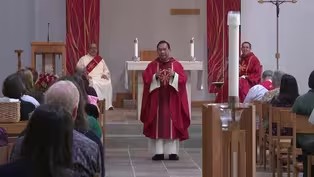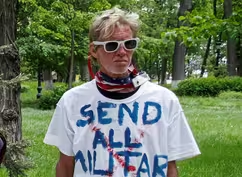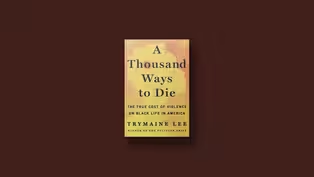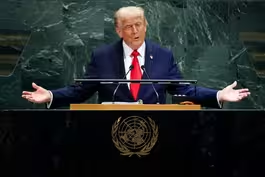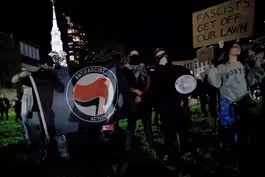
How changes to H-1B visas could impact American businesses
Clip: 9/23/2025 | 8m 21sVideo has Closed Captions
How H-1B visa changes could impact American businesses and workers
The Trump administration moved forward today with its overhaul of H-1B visas for highly skilled foreign workers. The president is proposing a $100,000 fee for anyone applying for the visa. The plan is sparking concern as employees and companies that rely on the workers race to understand the consequences. William Brangham has two perspectives on the plan from Justin Wolfers and Ronil Hira.
Problems playing video? | Closed Captioning Feedback
Problems playing video? | Closed Captioning Feedback
Major corporate funding for the PBS News Hour is provided by BDO, BNSF, Consumer Cellular, American Cruise Lines, and Raymond James. Funding for the PBS NewsHour Weekend is provided by...

How changes to H-1B visas could impact American businesses
Clip: 9/23/2025 | 8m 21sVideo has Closed Captions
The Trump administration moved forward today with its overhaul of H-1B visas for highly skilled foreign workers. The president is proposing a $100,000 fee for anyone applying for the visa. The plan is sparking concern as employees and companies that rely on the workers race to understand the consequences. William Brangham has two perspectives on the plan from Justin Wolfers and Ronil Hira.
Problems playing video? | Closed Captioning Feedback
How to Watch PBS News Hour
PBS News Hour is available to stream on pbs.org and the free PBS App, available on iPhone, Apple TV, Android TV, Android smartphones, Amazon Fire TV, Amazon Fire Tablet, Roku, Samsung Smart TV, and Vizio.
Providing Support for PBS.org
Learn Moreabout PBS online sponsorshipGEOFF BENNETT: The Trump administration moved ahead today on its overhaul of H-1B visas for highly skilled foreign workers.
A 30-day public comment period is now set to begin on the president's proposal to require a $100,000 fee for anyone applying for the visa.
The move is sparking concern, as employees and companies that rely on the workers, especially those in the tech sector, race to understand the consequences.
Our William Brangham has more.
WILLIAM BRANGHAM: That's right, Geoff.
More than half-a-million people are currently living and working in the U.S.
on H-1B visas.
They work in so-called specialty occupations that require at least a bachelor's degree.
The president argues that, by increasing the cost of these visas, companies will be incentivized to hire more American-born workers, though some economists worry it will stifle innovation and cut off a vital supply of new talent.
For more, we turn to two different perspectives on this.
Justin Wolfers is a professor of economics and public policy at the University of Michigan, and Ronil Hira is an associate professor of political science at Howard University.
Gentlemen, thank you both for being here.
Ron, to you first.
Before we talk about the efficacy of what the president is trying, I want to talk a little bit about the pros and cons of this visa program.
I know you support what the president is doing here, because you believe these visa programs, this one in particular is flawed.
Explain why.
RONIL HIRA, Howard University: Sure.
The first thing to understand is, this is guest worker program, and these folks are guest in the (AUDIO GAP) as long as they're working.
And like any guest worker program, they have got to be really tightly regulated, so controlled to ensure that workers are protected.
So the workers are -- can be easily exploited because they can be paid left, and they're also indentured to their employers, because the visa is actually held, their work permit and legal status in the U.S.
is held by the employer, not by the worker themselves.
So they're really cheaper and indentured workers competing sort of head to head with U.S.
workers.
That distorts the labor market.
It's bad for those guest workers who are being underpaid, but it's also bad for the U.S.
economy and for U.S.
workers who are competing with them, because it drives down the wages for U.S.
workers and it also eliminates many job opportunities for those workers.
WILLIAM BRANGHAM: And, Justin Wolfers, what is your response to that?
I mean, this is what the president argued in his E.O.
It said that the H-1B program has been deliberately exploited to replace, rather than supplement American workers with lower-paid low-skilled labor.
Do you believe that that's true?
JUSTIN WOLFERS, University of Michigan: Let's just look at the rules of the program.
You can't bring in the guest worker at lower wages.
You have to pay them according to what they call the local prevailing wage for that occupation.
So if there are reasons to have concerns about this program, and I think there's always ways in which we can improve things, it's about actually making sure we enforce the rules.
But this program -- let's not let the perfect be the enemy of the good.
This program has a lot of benefits.
Let me explain it this way.
Economics is like baking a cake.
You put a whole lot of ingredients into the mixing bowl and we bake our economic cake.
Sometimes, though, in America, we discover there's a particular ingredient we don't have enough of.
And so what we do is, we Instacart that ingredient, which is we offer an H-1B visa so we can keep baking that beautiful cake.
If you can't bring in someone who has that ingredient that we need, what are we going to do?
We could quit baking.
That's going to hurt Americans.
You could keep baking, but if you can't get the ingredient you need, you could use an inferior ingredient.
Well, that means we're going to bake worse cake.
Or instead of baking the cake, we could just buy it, which in this context would mean importing it from abroad, rather than making it in America.
So the point is, if this program works as it's meant to, it helps all of us bake the economic cake that keeps all of us -- keeps all of us productive.
WILLIAM BRANGHAM: Ron, what is your response to that, that there is a fairly well-documented shortage of STEM workers in particular and that the American tech sector does want to keep growing and innovating and it needs these workers, and sometimes those workers have to come from abroad?
RONIL HIRA: So part of the problem with the discussion here is that even very bright people don't understand what the actual rules are.
Now, in terms of wages, the prevailing wage sounds like a market wage, but it's actually artificially set by the Labor Department.
And it's set way below what an American worker would earn.
And so what happens is employers can hire these workers at below-market wages, bypass the U.S.
labor market.
They're not -- they can even replace their U.S.
workers, which happen quite frequently.
There's a huge business model around that.
And so what you're doing is, you're really undermining everything that Professor Wolfers says is in the program, but isn't actually in the program if we actually look at the rules and the facts that are there.
And so this isn't really about innovation.
There's certainly very talented people who come on the H-1B.
Maybe that's an aspiration, but in fact that part of what the proclamation, the executive order that was issued, was to fix that prevailing wage, to raise those wages very significantly, to be much more selective, to ensure that these workers are actually -- that are being imported, the guest workers, are actually filling real labor market gaps where there aren't U.S.
workers available.
The idea that there's a systemic or a broad-based shortage of STEM workers is just false.
It's pretty straightforward to look at.
If you have a shortage of any good or service, let's say we had egg shortages a while back, what you would do is, you would see the market prices going up, so the price of eggs went way up.
You look at wages for STEM workers, for scientists, engineers, technologists, in fact, wages are flat or declining.
They have actually been doing worse than many other professional occupations.
And so we (AUDIO GAP) have record numbers of domestic students who are graduating in engineering and computer science.
And, by the way, their unemployment rates are at record levels.
And the vast majority of H-1B workers are coming in either at entry-level or junior-level positions, competing directly head to head with our American graduates who can't find jobs right now.
WILLIAM BRANGHAM: Justin, a question about the efficacy.
Do you believe that raising the fee for these visas will have the intended effect, meaning more American workers are hired?
JUSTIN WOLFERS: So the White House's theory of the case is, you charge a high price for something and people do less of it, which is to say fewer firms will apply for H-1B visas, there will be fewer skilled workers into the United States.
The question is, what next?
One way to think about this is, maybe those skilled workers from abroad are a substitute who take the jobs of Americans.
That's the White House's theory.
A different theory is, when I work at my computer, I'm working with a machine.
That machine makes me more productive.
It's a compliment.
Maybe if I were working with a high-skilled STEM worker from abroad, that would make me more productive and that would actually lead to greater employment of Americans.
Look, this isn't a question of economic theory.
What we can simply do is look at the data.
What has happened in the past when the government has cut back on H-1B visas?
The very best available research says it has almost no effect on the employment levels of Americans.
But the more that we allow foreign scientists to come in and help turbocharge innovation, in fact, it turns out that the wages of college-educated Americans tend to rise and the wages of non-college-educated Americans tend to rise, but not as much.
The idea here is, if you get enough of the right skills, you can make everyone in the firm collectively more productive, and therefore they get paid a bit more.
WILLIAM BRANGHAM: All right, that is Justin Wolfers and Ron Hira.
Thank you both so much for being here.
JUSTIN WOLFERS: A pleasure.
RONIL HIRA: Thank you.
American bishop emerges as a new voice of the church
Video has Closed Captions
Clip: 9/23/2025 | 7m 59s | First American bishop appointed by Pope Leo emerges as a new voice of the Catholic Church (7m 59s)
Man convicted of trying to assassinate Trump at golf course
Video has Closed Captions
Clip: 9/23/2025 | 3m 43s | Man convicted of trying to assassinate Trump at Florida golf course last year (3m 43s)
New book offers a personal and historical take on violence
Video has Closed Captions
Clip: 9/23/2025 | 8m 47s | 'A Thousand Ways to Die' offers a personal and historical take on the impact of violence (8m 47s)
Trump suggests Ukraine could reclaim territory from Russia
Video has Closed Captions
Clip: 9/23/2025 | 7m 1s | Trump suggests Ukraine could reclaim territory from Russia (7m 1s)
What is antifa and why Trump calls it a terrorist group
Video has Closed Captions
Clip: 9/23/2025 | 4m 16s | What is antifa and why Trump wants to label it a terrorist organization (4m 16s)
Why some stations won't air Kimmel's return to late night
Video has Closed Captions
Clip: 9/23/2025 | 6m 21s | Why some stations won't air Jimmy Kimmel's return to late night (6m 21s)
Providing Support for PBS.org
Learn Moreabout PBS online sponsorship
- News and Public Affairs

FRONTLINE is investigative journalism that questions, explains and changes our world.

- News and Public Affairs

Amanpour and Company features conversations with leaders and decision makers.












Support for PBS provided by:
Major corporate funding for the PBS News Hour is provided by BDO, BNSF, Consumer Cellular, American Cruise Lines, and Raymond James. Funding for the PBS NewsHour Weekend is provided by...

